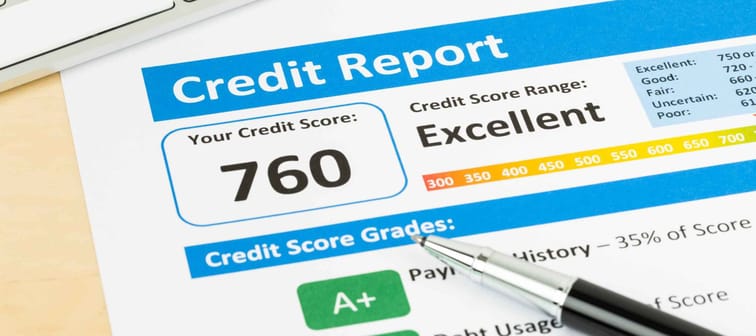Week 1: get your free credit report and dispute errors
First, get your credit score and credit report directly from one of the main Canadian credit bureaus that keep track of your credit history and calculate your score (TransUnion or Equifax). This way you’ll get your score and report instantly, and you’ll be able to monitor any changes, whether caused by your behaviour or fraud. You can also request a free credit report from either Equifax or TransUnion, which you’re entitled to once a year, but it will take some time (you have to write in) and it does not come with your credit score. We recommend you check your credit report at LEAST 2 times a year. Next, review your credit report and check for errors. Some people think that disputing an error on your credit report can have a negative impact, but this is a common credit score misconception. If you find any errors, it’s up to you to call Equifax and TransUnion and have them correct the errors. Don’t ignore them – the information on your credit report is used to calculate your credit score. Common errors to look for are:
- Ensuring that the lines of credit are accurate and up to date. If the credit lines on your credit report are smaller than they actually are, it could impact your credit utilization rate, which will decrease your credit score.
- Ensuring that any reported delinquencies or charged-off balances are accurate. Late payments are the single most important determinant of your credit score. If there’s any error fix it, and fix it fast.
- Ensuring that credit accounts are accurate and up to date. If you get instances of credit fraud, where somone has opened a credit account in your name (credit card, sales finance, car lease, etc…), the only way to know is by checking your credit report.
- Make sure your name and address are spelled correctly, otherwise, some banks trying to report your good habits to the agency, may not be recorded.
You can either dispute a record with the creditor, or the credit bureau. If you open a dispute with the credit bureau, just make sure to close it out – don’t leave it open or pending without resolution.
Week 2: increase credit lines
Ok, so were not asking you to take on more debt. However, the credit bureaus don’t like when your credit utilization exceeds 30% – because then it looks like you’re taking on more debt than you can handle. Credit utilization equals your total debt divided by your total avaialble credit. As a result, if you keep the same amount of debt, and increase your credit lines, you’ll decrease your credit utilization. Also, having a higher credit line means that when you do run through a large expense some time inthe future, you’ll be prepared and it won’t impact your score. You can increase lines by first going to your credit card provider and asking if you’ve been pre-approved for a line increase. If you haven’t been pre-approved, you can always apply for a line increase. Because issuers are no longer allowed to automatically increase your credit line without your express consent, you might also try giving your express consent so they can raise your lines in the future without require additional consent – some issuers require consent each time before raising your limits regardless.
Week 3: apply for additional credit
We’re not suggesting you lease a car or get a mortgage to improve your credit score! But you might want to consider getting an additional credit card, with no annual fee. As we mentioned above, the credit bureaus don’t like when your credit utilization exceeds 30%. You can increase your total available credit by increasing the lines on your existing accounts, as we did above, or by adding additional credit lines, with new credit products, such as a credit card or store card. This does two things. It lowers your credit utilization and it adds another credit product to your credit file. The more diversified your credit product profile, the better your score as well.
Week 4: set-up automatic payments
Now that you have a list of all your credit products, and applied for your new credit cards, make sure you ALWAYS pay on time. Paying on time doesn’t mean you have to pay off your balance, it just means you have to make your minimum monthly payments. The absolute best way to ensure you’re never late, is to set-up automatic bank payments to your credit accounts. You can automatically set the amount to be paid at the minimum payment, a fixed payment you determine, or to pay off the entire monthly balance. Regardless, there’s absolutely no excuse to being late, and nothing will ruin your credit faster than a late payment.
Get help with a credit building tool
You can also get help improving your credit much faster with a credit building tool like those offered by MyMarble. MyMarble connects to your primary bank account and assesses your spending trends. The next thing is to set you up with a real plan and real-time recommendations to help reshape your spending and improve your credit. Depending on the plan you choose, you’ll gain access to MyMarble’s varied credit building tools and financial education platform and get some peace of mind knowing you have the help you need to move forward.





